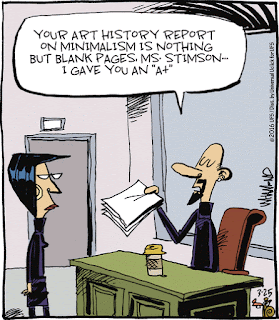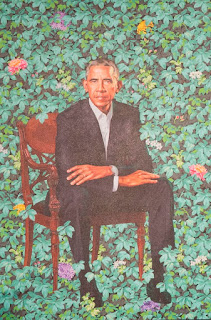Mass murder by gunfire is not unknown in other countries, but it is immeasurably more prevalent here in the United States. There are many reasons why these massacres occur here with such numbing regularity, including "mental illness" (the go-to excuse), lack of parental guidance and oversight of their children's activity, the decline of empathy, and the desensitization to violence of generations of people who have grown up with explicitly violent television shows, movies, and video games. These factors all contribute to the
why. It's the
how that is so difficult to address. No matter how you explain it away, it's an undeniable fact that the use of a powerful weapon equipped with quickly-replaceable, large capacity magazines makes it possible for a single person to kill large numbers of people in a very short period of time ... which is, in fact, what the original ancestors (the German
Sturmgewehr, the US Army's
M-16, and the Russian
AK-47) of today's civilian-marketed military-style semiautomatic rifles were designed to do.
I feel passionately about this issue, and I've written about it, both here and on Facebook, many times (25 on this blog alone), with no particular result other than to feel better about venting my spleen. I've grown tired of being lectured by my conservative and right libertarian friends on what they see as my faulty understanding of law and the
Constitution, since the
Second Amendment to the Constitution unambiguously enshrines the right of everyone to keep and bear arms, end of discussion, go sit down until you have something worthwhile to say.
Well, I like to think that I
do have something worthwhile to add to the debate. Therefore, Dear Readers, in full recognition of the likely futility of the effort, I am presenting my proposal for amending the Second Amendment. Before you stop reading because you've already decided I'm a clueless bleeding heart liberal who can't possibly have anything worthwhile to say, why not read my suggestion and the discussion that follows it, and then leave a thoughtful and well-reasoned comment ... remembering that the Constitution, in addition to guaranteeing the right to keep and bear arms, also contains a mechanism by which it can be amended*.
This is the text of the Second Amendment as it appears in the Constitution:
"A well regulated Militia, being necessary to the security of a free State, the right of the people to keep and bear Arms, shall not be infringed."
Here's my proposed revision:
"The second article of amendment to the Constitution of the United States is hereby repealed in its entirety and replaced with the following:
"Section 1. A well-regulated militia being necessary to the security of a free state, the right of citizens and lawful residents of the United States to possess and maintain arms while serving as members of a legally-constituted state militia, subject to such restrictions as may be imposed by state and local authorities, shall not be infringed.
"Section 2. The right of citizens and lawful residents of the United States to possess and maintain firearms for use in hunting, sports, or personal protection, subject to such restrictions as may be imposed by state and local authorities, shall not be infringed.
"Section 3. Congress shall have power to enforce this article by appropriate legislation."
Here's my thinking:
It's pretty clear to me, reading the relevant sections of the
Federalist Papers, that the Founders envisioned establishing state-level militias to do two things: minimize the size and power of a standing federal army**, and provide states an armed citizen force*** to protect them against the power of a tyrannical**** national government (see
Federalist 46). Having been subjected to oppression by a king's army, the Founders were understandably suspicious of national governments with a monopoly on coercive force. Their solution was to empower the individual states to establish
"well-regulated militias" as a counterweight to federal power. Of course, there might be some problems involved in the establishment of
"well-regulated militias;" these were summarized by Alexander Hamilton in
Federalist 29. And I think it's important to clearly specify that the
"militias" envisioned by the amendment must be
"legally-constituted" state-level formations in order to keep every angry person with an axe to grind from dressing up in camouflage, stockpiling guns, and creating his own private army in some remote wilderness.
But it is the private ownership of firearms, not the formation of militias, that is the major focus of the gun debate in this country. There are numerous points of view on the necessity and desirability of such ownership, and I won't rehash them here, other than to make what seem to me to be some pertinent points:
- There is a great difference between the opinions and concerns of people living in rural areas, where hunting is a traditional and cherished pastime and guns are respected for their deadly power, and those living in urban areas, where street crime by armed criminals is a concern.
- The term
"arms" used in the wording of the Second Amendment is imprecise and, thus, subject to wide interpretation
†.
"Arms" in the 18th century were single shot muskets and the like. We will never know how the Founders would have viewed the private ownership of semiautomatic rifles with large capacity magazines, bump stocks, and silencers/suppressors, but I suspect they might have been a bit more careful with their wording.
I suggest that the differences of opinion between urban and rural populations could be addressed at least in part by making the ownership of firearms a guaranteed right under the Constitution at the national level, but subject to regulation at the state and local level in response to legitimate local concerns. After all, if the Jackbooted Government Thugs™of the
ATF and the
FBI are a concern, perhaps the delegation of their authority over firearms to the state or local level
†† - closer to the concerns and wishes of the local populations - could make reasonable restrictions more palatable.
I have changed the current wording
"keep and bear arms" to
"possess and maintain arms." This is an attempt to rein in the national-level, one-size-fits-all argument about whether or not
"keep and bear arms" allows citizens to openly carry firearms in public. My personal opinion is that both
"open carry" and unlimited
"concealed carry" are staggeringly bad ideas in 21st century America, but if it's to be allowed, it should be a decision made at the local, rather than the national, level, and then only after robust public debate
†††.
I have also changed
"the people" to
"citizens and lawful residents of the United States." This firmly establishes the right to own firearms as a privilege of citizenship or legal residency, and provides a Constitutional basis for denying access to firearms to
illegal immigrants. This does not, of course, prevent illegal immigrants from illegally obtaining and using firearms, but it strengthens the case for imprisoning or deporting illegal immigrants who commit other crimes using firearms.
By most estimates, there are now more guns in private hands in the United States than there are people to wield them. No power on earth is ever going to forcibly pry all those guns (and all the high-capacity magazines, bump stocks, and silencers/suppressors already in circulation) out of their owners' cold, dead hands, so let's agree to stop obsessing about what will never happen and concentrate on not making the problem worse than it already is.
Let's face it: we will never change the Second Amendment as long as there is no appetite in Congress to stand up to the small but very powerful, vocal, and wealthy gun lobby, but it's one of my safer fantasies. And who knows? - in combination with a national willingness to adequately address the treatment of mental health problems, a sudden blossoming of the willingness of parents to actually raise their children to be responsible adults, and more restraint on the gratuitous (if exciting) violence on TV, movies, and video games, it might help us be as safe as most of the rest of the developed world.
The train of rational discussion and simple human compassion relating to this issue sailed long ago ... in the words of a person who commented on one of my Facebook posts,
"It's absolutely unfortunate that kids are killed with guns." As long as such an attitude can be held, we're unlikely to make much headway in the debate.
So now you've heard my recommendation ... have at it.
Have a good day. More thoughts tomorrow.
Bilbo
* That would be Article V. And don't forget that we've already revoked one Amendment - the 18th (Prohibition), repealed by the 21st.
** That didn't work out as well as they might have thought, did it?
*** I would suggest that the "militia" equates to the National Guard formations of the individual states. And by the way, a "militia" in the time of the Revolutionary War consisted of ordinary citizens who answered the summons to action and brought their own weapons with them from home. Nowadays, National Guard units have their own arsenals - members of National Guard units do not bring their personal weapons when called up for service. This suggests that membership in a "militia" is probably no longer a useful rationale for owning a weapon. Just a thought.
**** "Tyrannical' is in the mind of the beholder. The fact that you philosophically or politically disagree with a particular law does not make it "tyrannical."
† The interpretation of the language of the Second Amendment is a cottage industry in itself. Writing in the majority opinion in the case District of Columbia v Heller, Justice Antonin Scalia noted that "In interpreting this text, we are guided by the principle that '[t]he Constitution was written to be understood by the voters; its words and phrases were used in their normal and ordinary as distinguished from technical meaning; where the intention in clear there is no room for construction and no excuse for interpolation or addition.'" Sadly, the full and detailed meaning and intent of the Second Amendment is not clear (despite those who demand to know "what part of 'shall not be infringed' do you not understand?"), and has been subject to interpretation since the founding of the republic.
†† The "supremacy clause" of the Constitution (Article VI) places the authority of the federal government above the laws of the individual states; this is why any attempt to modify it must clearly specify what limits the states are allowed to set on their own. We see the problem of federal-vs-state powers in attempts at the state level to legalize the cultivation and use of marijuana ... while the states may desire to legalize happygrass, it is still a prohibited substance under federal law.
††† I think it's also worth pointing out that "robust public debate" at the local level means just that - at the local level. We have seen in our politics the distorting effects of national special-interest organizations (of both parties and varied political agendas) pouring money into debates at the state and local level in order to overwhelm opposition.


















































